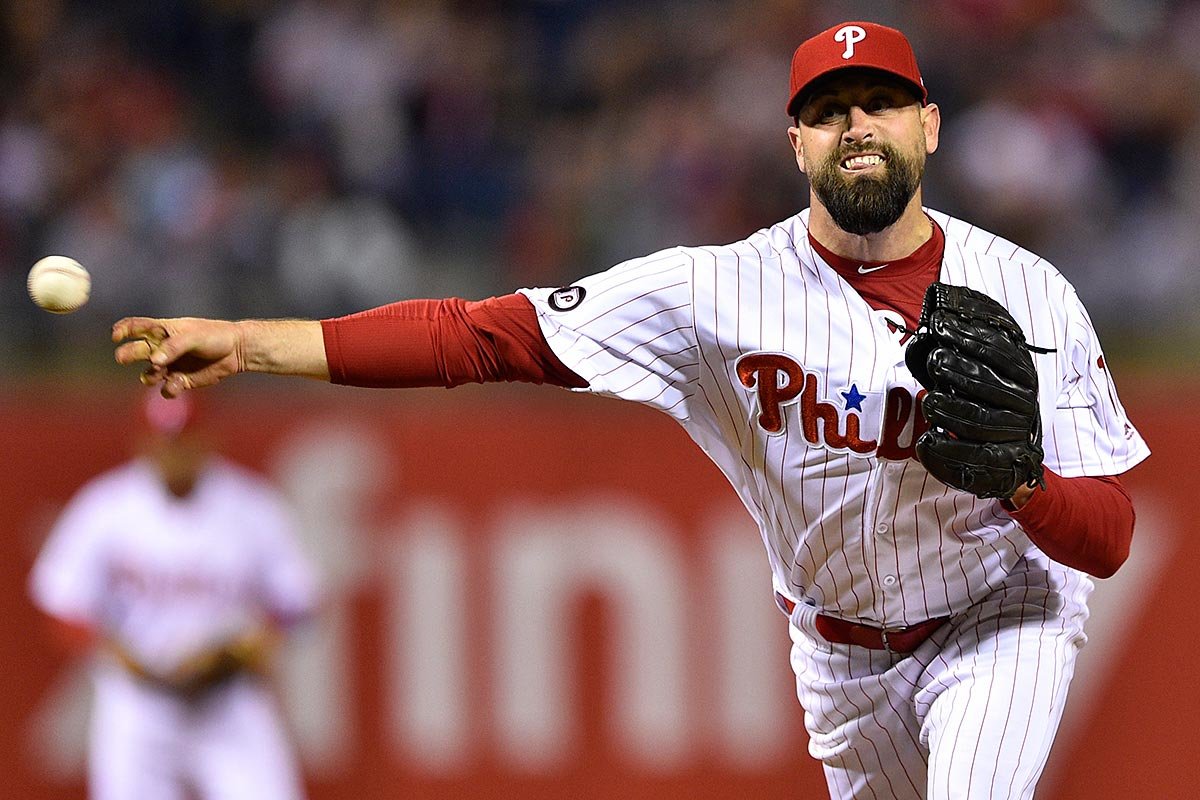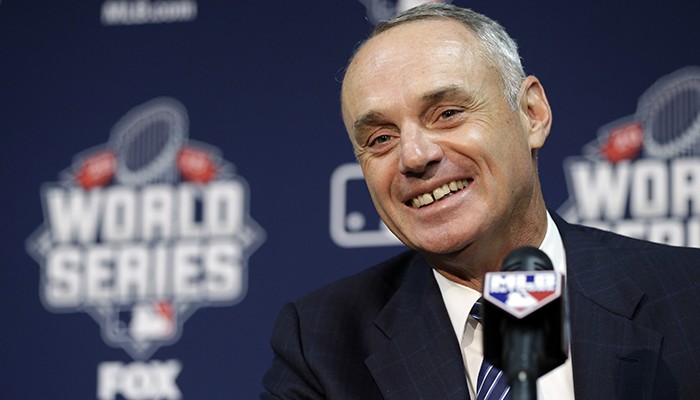
It’s going to happen.
The players know it.
Major League Basebll Players Association executive director Tony Clark knows it.
And, yes, Commissioner Rob Manfred, the one with the power to deliver the executive order, certainly knows it.
Major League Baseball will be implementing a pitch clock next season. Perhaps limit visits to the mound, too. One day, hopefully a long time in the future, even start extra innings with runners on base.
But change is coming, whether the players like it or not.
“You know it’s going to happen, no doubt about it,” Philadelphia Phillies All-Star reliever Pat Neshek told USA TODAY Sports. “Most of us don’t like it. But he’s going to do what he wants to do.
“And after the pitch clock, there will be something after that. And something after that. And 50 years from now, we’ll say, ‘How did we get to this point?’ It will be the little things like this.”
The pitch clock was implemented in 2015 in the minor leagues but has been steadfastly opposed by major league players. Yet, despite the union’s objections, Manfred has the right to unilaterally implement the pitch clock and other changes after this season under the provisions of the collective bargaining agreement.
“It seems pretty drastic to me,” Cleveland Indians All-Star reliever Andrew Miller said. “I’m not for the pitch clock. I’m very against it. I wish we were listened to a little bit more. Having the downtime in games is a bigger issue for me.
“But I don’t think anybody is pushing on anything that’s going to ruin the game. Rob hasn’t done anything that we all dug our heels in on. Players tend to be resistant to change, but it probably wouldn’t be that big of a deal. We’ve done some things that are more blasphemous than that.
“We got replay, and I think replay has gone really well, and it took us a little while to get it right, but it’s made the game better. We all want the best product on the field, and the best product is the one the fans want to watch. If pace of a play is an issue, then we need to address it.”

It is a problem, Manfred will tell you, although he took a much more conciliatory approach when discussing it Tuesday with the Baseball Writers’ Association of America than when he lashed out at the union in spring training.
There were no threats of unilaterally implementing the pitch clock, as he did in February. There were no disparaging remarks about the union being uncooperative about making changes to speed up games.
But make no mistake about it, Manfred worries about the fact games are lasting a record 3 hours, 5 minutes this season. He’s perturbed that there’s more inactivity than ever before, with about 33% of all at-bats resulting in a strikeout, a home run or a walk.
Yet, the players will argue, and they are absolutely right, the game is healthier than ever.
If you’re not convinced enough by the ratings of last year’s World Series and Monday’s Home Run Derby, check out the downtrodden Miami Marlins, a franchise that’s expected to soon be sold for about $1.2billion.
“I personally like the way the game is right now,” Washington Nationals All-Star second baseman Daniel Murphy said. “It seems like the fans are enjoying themselves. I’m not hearing much grumbling from the players.
“This is a $9 billion industry, so the game just seems to be in a very healthy situation right now from that perspective.”
Still, the MLB officials worry. They are seeing NBA summer league games sell out in Las Vegas. There’s more attention to NFL combines than the early rounds of the baseball postseason. The biggest stars on Madison Avenue play sports other than baseball.
“I think we take all of these faces and you market them more,” Pittsburgh Pirates All-Star infielder Josh Harrison says. “You’ve got LeBron James and other basketball players, there’s a difference. Those guys you can turn on Fox, and they’re on a commercial. You can turn on ABC, they’re on a commercial. We’re on MLB Network, which is fine, but I think you can do more to market a little bit more in those aspects.”
The best way to market the game, the folks at MLB offices insist, is to have a cleaner, quicker, well-paced game.
But it’s also time to quit talking so publicly about the time of games, disparaging the same product they’re trying to market.
“I actually really like the game,” Manfred said. “But it’s not what I think or what I like. The issue is what the fans want to see. I think our research suggests that the home run is actually a popular play in baseball. Strikeouts, especially by a single pitcher, fans like.
“I think where it gets troubling from a fan’s perspective is when there are tons of strikeouts, no action and a lot of pitching changes — that is troubling to me.”
Don’t blame the players, blame the new-age front offices. It’s suddenly OK for Minnesota Twins All-Star outfielder Miguel Sano to strike out 120 times, while Los Angeles Dodgers All-Star third baseman Justin Turner can hit .377 without any fanfare.
“Ten years ago, we thought a strikeout was a horrible thing,” Miller says. “Now, the players strike out a lot, but if your OPS (on-base-plus-slugging percentage) is high enough, or your exit velocity or your launch angle is right, they don’t care if you strike out at historically high levels.”
Miller and other pitchers would like to see a bigger strike zone, thinking that the bigger the zone, the more hitters will swing, perhaps creating more hits and reducing the number of walks.
“If they really want to speed up baseball, the umpires can control the pace of play as much as us,” Neshek says. “I think the umpires can dictate the game by the score. If it’s 6-0, open that strike zone a little bit. Just don’t tell anybody. I see games that are 8-0, and umpires are calling it like a 1-0 game.
“If you’re going to juice the baseballs without telling anyone, then you can open the strike zone without telling anyone, either.”
In the meantime, Manfred and Clark keep talking. Though Manfred can unilaterally implement the changes, he wants to make a deal with the union. He thinks change is needed but needs the players to go along with it, not wanting them to be publicly critical of the changes.
“It’s a delicate balance to not change the game so much that the current fan wouldn’t recognize the game,” Clark says. “It’s a discussion of how to move the industry forward together.”
The players are listening but cautious, not wanting dramatic change to the game they grew up loving as kids.
“I don’t want to play 31/2-hour games every night,” Colorado Rockies All-Star outfielder Charlie Blackmon says, “but at the same time, I don’t want someone with a stopwatch telling me to get in and out of the box. I think players can get used to anything to a certain extent, but I just don’t know if this makes sense. I guess we’ll all find out soon.”
This article was republished with permission from the original publisher, USA Today. Follow Bob Nightengale on Twitter and Facebook.